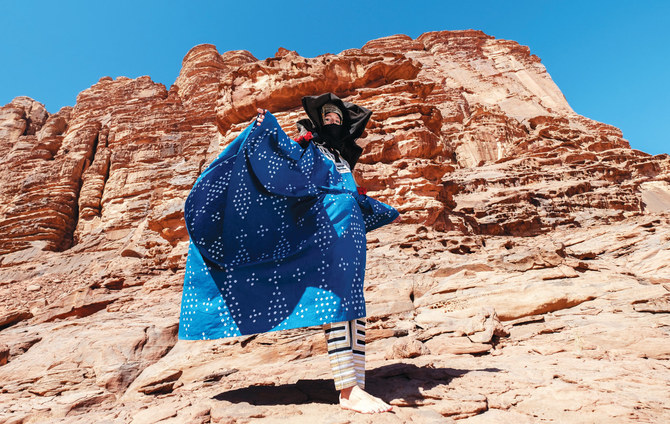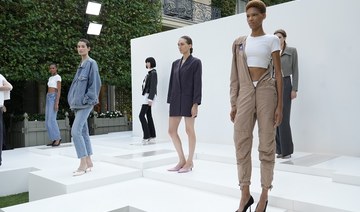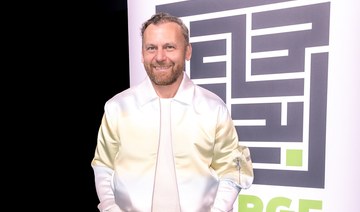DUBAI: Move over, Milan. Not today, New York. It’s Riyadh’s turn to shine on the global catwalk as social reforms and economic diversification across the gamut of sectors propel Saudi Arabia toward the ranks of international capitals of the fashion industry.
In July, Mohammed Ashi became the first Saudi designer to show at Paris Haute Couture Week — a leading event in the global fashion calendar — by invitation of the Federation de la Haute Couture et de la Mode.

Models present creations by Ashi Studio during the Women's Haute-Couture Fall/Winter 2023/2024 Fashion Week in Paris n July 6, 2023. (AFP)
This September, a hundred Saudi brands will head to Italy’s style capital Milan to present their designs in WHITE Milano, one of the most anticipated events during Milan Fashion Week.
The rise of Saudi fashion designers is a relatively recent development, owing in part to a host of government-sponsored initiatives, including the Ministry of Culture’s Fashion Commission, established in 2020 to lead the sector’s expansion.
Saudi fashion emerged as an important catalyst for economic growth and diversification in line with Crown Prince Mohammed bin Salman’s Vision 2030 reform agenda, launched in 2016 to help the Kingdom branch out beyond hydrocarbons.

The Since 2087 gallery in Jeddah. Since 2087 is a brand founded by Saudi creative director Abduljalil Abduljawad. (Supplied)
The Fashion Commission recently published a report, “The State of Fashion in the Kingdom of Saudi Arabia 2023,” to help local and international stakeholders understand the scale of the opportunity offered by the country’s emerging fashion industry.
“It holds the largest projected growth rate of any other large, high-income market,” Burak Cakmak, CEO of the Fashion Commission, told Arab News.
“Fashion is now very much a key economic driver of Saudi Arabia’s growth with the report showing retail demand for fashion products in the Kingdom is forecast to increase by 48 percent to $32 billion in 2025, with luxury retail set to enjoy 19 percent growth.
“We’re taking Saudi fashion from a predominantly domestic-focused market to the international stage and our home-grown brands, some established and some emerging, attend major fashion weeks and are building customer bases around the world.”

Burak Cakmak, CEO of the Saudi Fashion Commission. (Supplied)
Among the initiatives spearheaded by the Ministry of Culture through the Fashion Commission is the first-ever Riyadh Fashion Week, scheduled to take place from Oct. 20-23. The aim is “to sit among the most popular fashion weeks in the world,” Cakmak said.
“We look forward to giving a warm welcome to visitors from across the globe and showcasing what Saudi fashion and luxury has to offer.”
While fashion shows have been held in private settings in Saudi Arabia for many years, it is only since the social reforms implemented after 2016, including the suspension of laws requiring women to wear head coverings, that such events moved into the public domain.
Dolce & Gabbana staged its first fashion show in the historic desert region of AlUla in 2022, while other prominent fashion and jewelry brands such as Chaumet and Van Cleef & Arpels, among others, have also staged events in the Kingdom.
FASTFACTS
Saudi Arabia’s Ministry of Culture established the Fashion Commission in 2020 to lead the sector’s expansion.
Demand for fashion products in the Kingdom is forecast to increase by 48 percent to $32 billion in 2025.
Above all, the Vision 2030 reforms have cleared the way for talented young Saudi designers to flourish in the industry, establishing their careers and showcasing their work on the domestic, regional and global stage.
“The world has its eye on Saudi Arabia — whether it’s through our participation in global sports, promoting the Kingdom as a new tourism destination, or a global player in the start-up economy,” Marriam Mossalli, a Saudi lifestyle editor, journalist and founder of communications agency Niche Arabia, told Arab News.
“There are so many sectors that utilize fashion, whether it’s the staff uniforms of a new resort by the Red Sea Development Company, or costumes for a new play produced by the General Entertainment Authority. There are so many opportunities for young Saudi talent to get involved and have their homegrown aesthetic celebrated.”

Princess Noura bint Faisal Al-Saud, top left, wearing designs by Mona Alshebil. Alshebil, Niche Arabia founder Marriam Mossalli (top, right) and Mohammed Ashi (above, left) are among the Saudi creative talents who have entered the international fashion scene. (Photos: Mona Alshebil/Lina Qummosani/Saudi Fashion Commission/AFP)
In 2021, the Fashion Commission launched the “100 Saudi Brands” initiative, aimed at supporting and empowering Saudi designers by providing them with mentorship, guidance and resources to help them achieve international success in the fashion industry.
The initiative has demonstrated the Saudi government’s commitment to promoting and developing the country’s fashion industry while supporting its designers to reach their full potential.
“Being part of the 100 Saudi Brands for the last two years, I have greatly benefited from all the experts we worked with,” Saudi designer Mona Alshebil told Arab News.
“Moreover, we participated in Milan Fashion Week, New York Fashion Week and Paris Fashion Week, with the support of the Fashion Commission.”
Others, such as the acclaimed designer Yousef Akbar, whose designs were featured on the cover of Vogue Arabia’s June edition celebrating new Saudi talent, say that until a few years ago there was no fashion industry to speak of in the Kingdom. Now that has all changed.

Saudi fashion designer Yousef Akbar. (Instagram)
“The fashion industry is now recognized as serious business for the government,” Akbar told Arab News. “Whereas before nothing was done about it. There was no fashion industry. Now there is the recognition that fashion is important, and it plays a key cultural and economic role.
“Secondly, the Saudi government’s investment in establishing the industry is crucial and thirdly, which in my opinion is the most important, are the designers themselves, because there is a lot of talent in the Kingdom and without the designers, there is no industry.”
Now, people around the world “can finally see that there are talented designers in the region and they’re just as good as anyone international.”
At the end of 2023, the Fashion Commission will also launch a first-of-its-kind product development studio in Riyadh. The production space will enable designers to create prototypes and samples to hasten market entry.

Brimming with diversity, Saudi Arabia’s topography offers picture-perfect backdrops for local and international fashion designers. (Photo: Saudi Style Council/NEOM)
The studio will be outfitted with cutting-edge technology, including 3D knitting and laser-cutting machines, with a view to being on par with the best factories in the world. Still, there is a lot of work to be done to forge a prosperous future for the fashion sector.
“We need to lay the foundation for an authentic fashion ecosystem that can evolve with the country, as well as complement the global fashion industry,” Mossalli said.
“From manufacturing and sales to marketing and media, Saudi Arabia can adopt best practices and find its niche among its international counterparts.”
This will involve continued investment in human talent.
“We will continue to be guided by the data as we build the foundations for an internationally networked value chain and invest in Saudi Arabia’s talent pipeline through educational programs to produce world-class designers, ensuring the Kingdom continues to grow as an integral part of the global fashion scene,” said Fashion Commission CEO Cakmak.

Mona Alshebil designs. Mona Alshebil is a Saudi fashion designer and part of the 100 Saudi Brands Organization. (Photo Courtesy of Mona Alshebil)
Many of the Kingdom’s up-and-coming designers are striving not only to grow their own brands but also showcase their country’s heritage and identity on the regional and international stage.
Fashion, therefore, has the potential to contribute both economic growth and enhance a sense of national pride.
“As an emerging designer in Saudi Arabia, my goal is to contribute to the growth and development of the fashion industry in the Kingdom,” said Saudi designer Alshebil.
“I am passionate about showcasing the unique beauty and creativity of Saudi fashion to the world, while also creating opportunities for local talent and celebrating the cultural diversity of Saudi Arabia.”



















